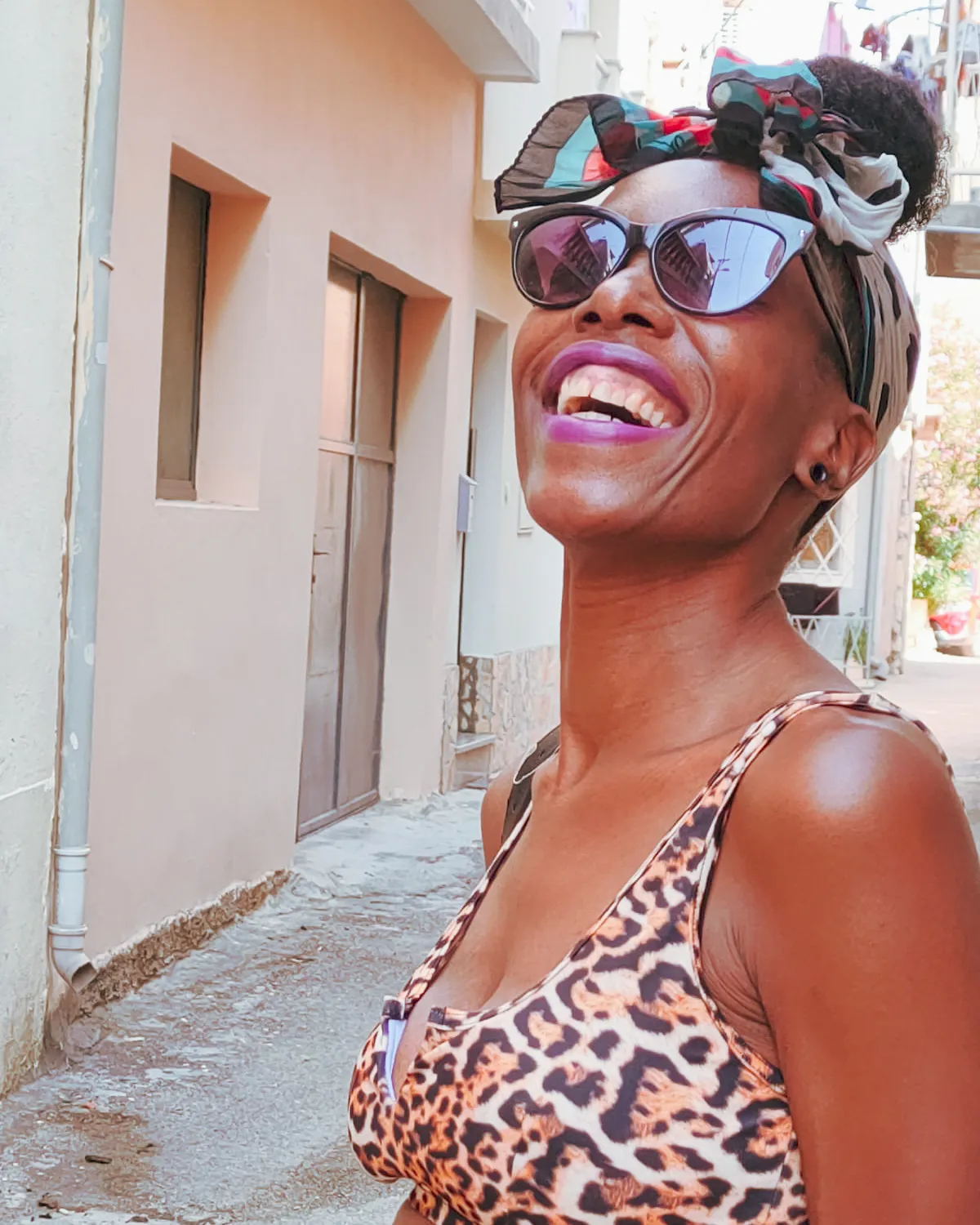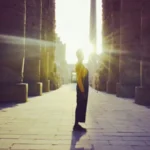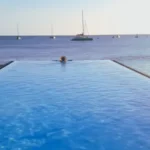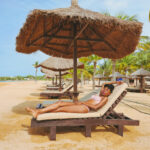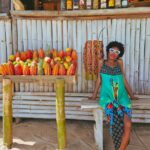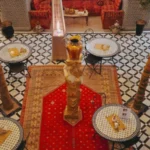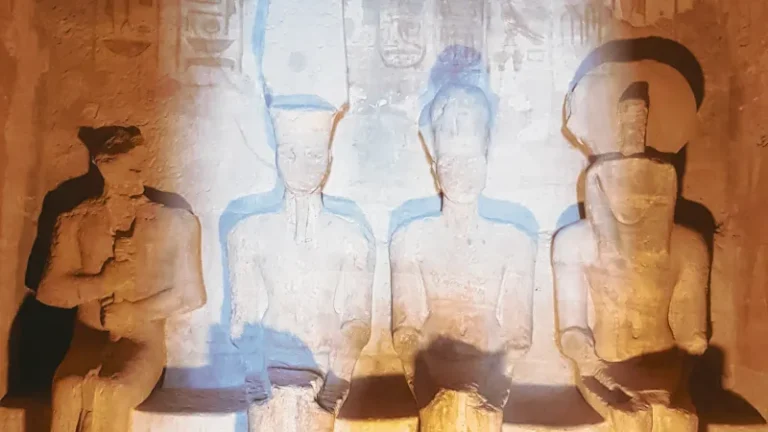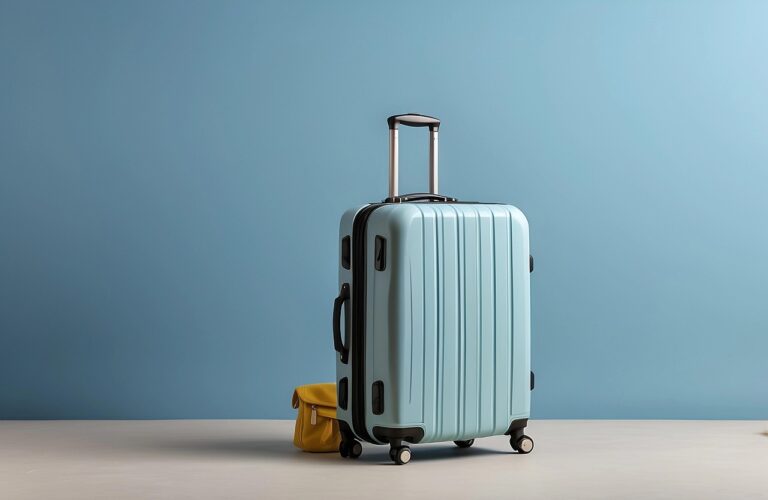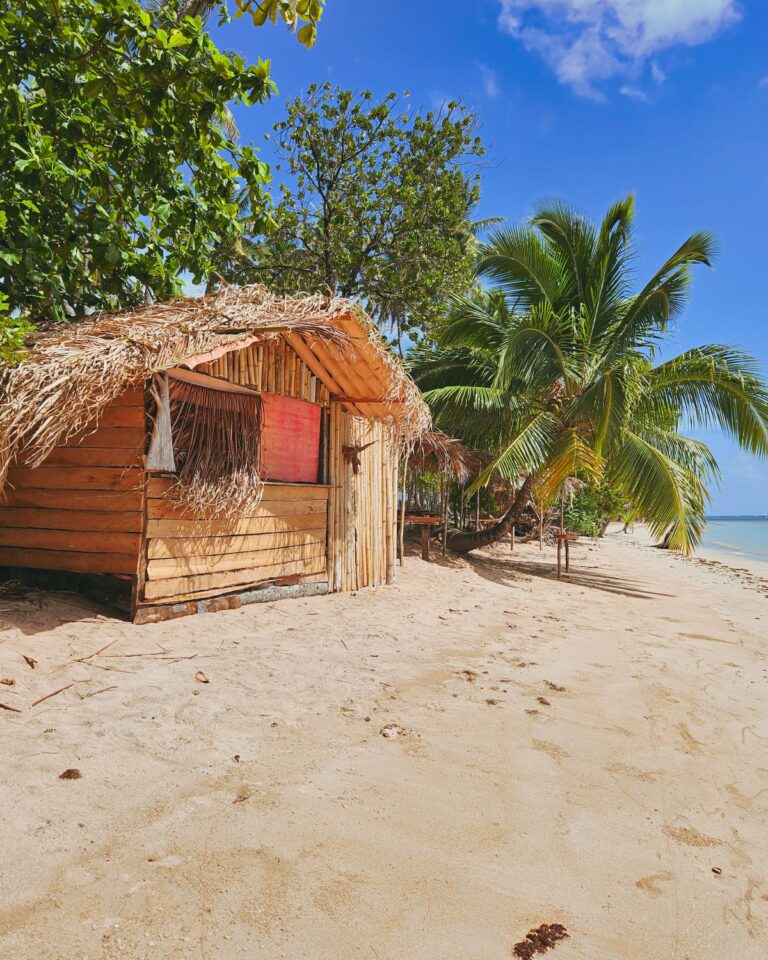“This is what we call an African massage”, says Hamza, our tour driver, as we bounce along the bumpy dirt road at the entrance to the Sahara. We have finally reached the village of Merzouga, south-east Morocco, for our Sahara Desert tour. The small village of Merzouga is approximately 31 miles from the Algerian border.
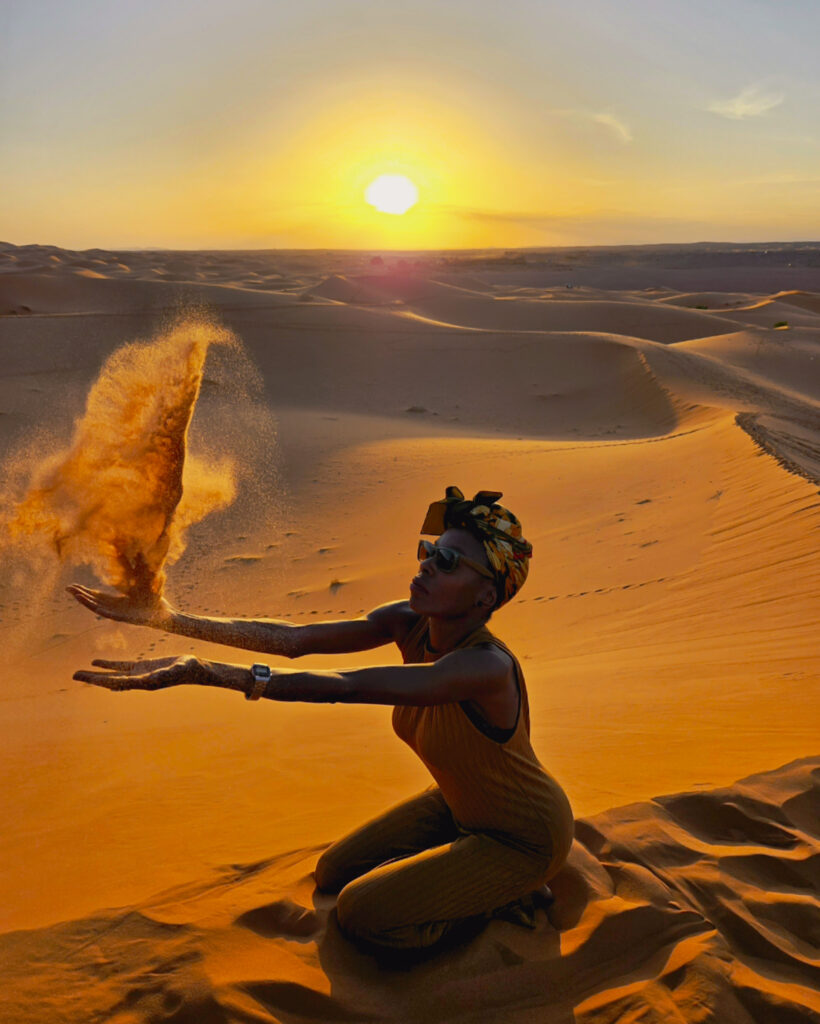
Sleepy from the long trip from Fez (approximately nine hours with stops along the way), I sit up, look to the right and clutch my chest upon sight and grandeur of the golden sand dunes. Looking to the top of the dunes, I see what looks akin to ants in a mountain of demerara sugar but are people at the top dwarfed by the size of the golden sand pile.
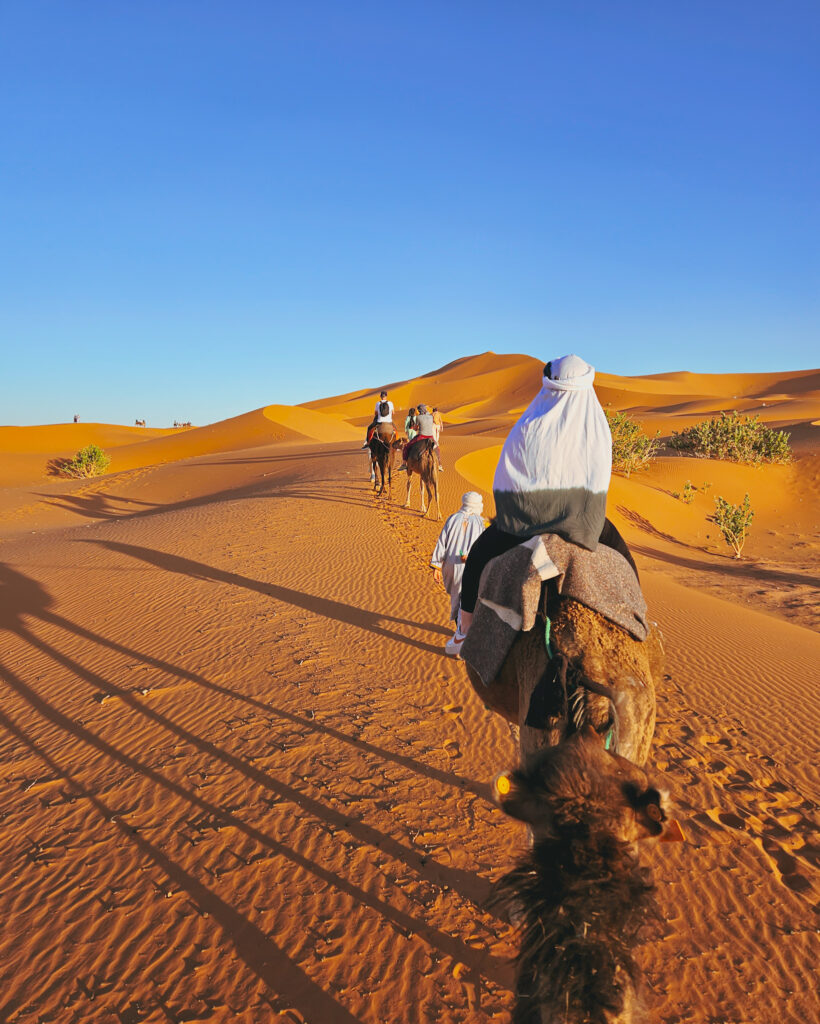
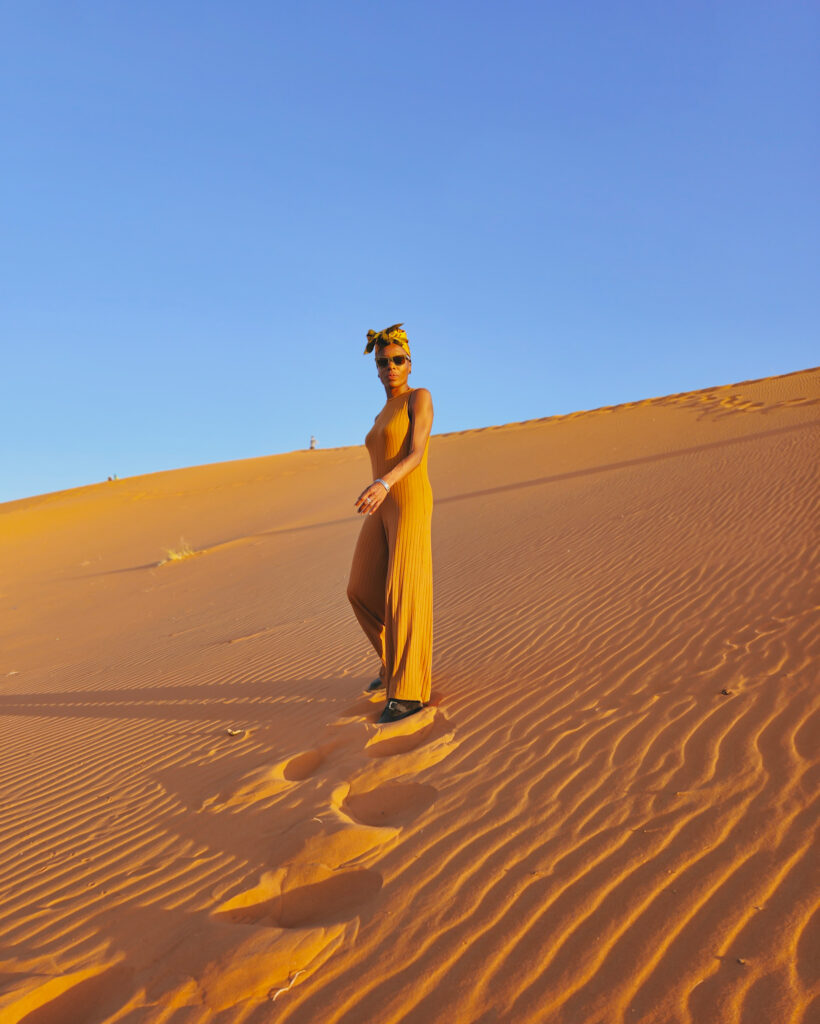
There are nine of us on the tour, including me, and we check in at the hotel reception before boarding our camels. We head on the flat towards the dunes, all in line well most of the time. Much like the person currently riding it, my camel does not conform.
We continue to the foot of the dunes, where we disembark and climb to the top of the dune, sinking with each step to make our way to revel in the golden sunset as it draws the curtains on the desert landscape.
Waiting for the desert Uber
After setting, the golden hue of the Sahara disappears with the sun, and it quickly darkens. It takes a while for the guides to return with our camels to make our way to the Berber camp. The tour did state that we would stay overnight in the Sahara, but I didn’t take it literally. However, there’s nowhere else I’d rather be right now.
We didn’t have to sleep in the dunes, though. Our camels eventually come to pick us up like desert Ubers to take us to camp, and we watch the stars on our camel ride but cannot sight the moon.
The Berber Camp
Upon arrival at the Berber Camp, we have the usual greeting of Moroccan mint tea. I am then shown to my tent by Mobarak. Mobarak is a Berber, and his parents were Tourareg from Timbuktu, who settled in Morocco. The Touareg people are a large Berber ethnic group that principally inhabit the Sahara in a vast area stretching from far southwestern Libya to southern Algeria, Niger, Mali and Burkina Faso. Small groups are also in northern Nigeria.
The Amazigh people, commonly known as Berbers, have been in North Africa before the Arab invasion. They live in mountainous areas of Morocco and other North African countries where they farm, shepherd livestock, and live a self-sustaining lifestyle, with a small percentage being nomadic.
Morocco and Algeria have the two largest populations of Berbers. They are estimated to make up more than three-fifths of the population in Morocco. In the Sahara of southern Algeria and of Libya, Mali, and Niger, the Berber Tourareg number more than two million. The Ancient and fascinating culture of the Berbers still thrives today. I loved gaining overstanding of the culture.
Accommodation Berber Style
I upgraded my tent to luxury, and I am impressed. The tents are superb standard, a good size, well equipped with a huge bed, AC, sofa, shower, toilet and Moorish furnishings. It’s better than some hotels I have stayed at.
Mobarak informs me we have ten minutes until dinner. I ask him if there will be drumming. He looks at me as if I’m crazy and replies, “of course, we’re African”.
I freshen up from the long day and head to the main tent to dine with the others in camp.
After dinner (one of if not the best vegetable tagine I have had so far in Morocco), Mobarak warms his drum by the campfire, and everyone gathers around it. The Berbers’ drumming is melodic and rhythmic, inspiring a trance as much as dance and raising the vibrations.
Sunrise in the Sahara
Waking early and walking out of camp is like a dream as I make my way across mountains of dunes to watch the sun rise over the Sahara. The shifting sands create a constantly changing landscape in the Sahara. Its majestic grandeur is humbling, and its peacefulness inspires reflection and contemplation.
While sitting with myself and playing in the sand, apart from the odd bird tweeting or rustling in the trees, I hear nothing other than the high-pitched ringing in my ears.
The Sahara displays a sunrise so beautiful that even the moon stays to watch, and as it rises, the warmth hits my face.
The ripples in the sand are like ocean waves, and desert trees dotted sparsely break up the gold with splashes of green.
Everything looks the same, and it’s easy to lose a sense of direction, but it draws you in to want to delve deeper into its emptiness.
Though others are here, somewhere, with such a vast expanse, you can feel alone in the world and bask in its stillness. I see a couple of things that look like they are small creatures of some sort that once had life and are now desert fossils.
Walking in the desert is hard work, and going uphill on dunes means sinking with every step.
It’s a good workout, but my body feels done in. That said, I carry home more than just aches and pains, but much like the shifting sands, a shift in perspective.
The Drum
After breakfast at the camp, I ask Aziz, one of the Berbers, to give me a basic drumming tutorial. I have a go (very badly) on the Djembe drum.
“Where in Africa are you from?”, he asks. I reply, “I don’t know.” To which he says, “Ah, ok. It doesn’t matter. It’s in you”.
Absolutely! It is in me, and though I am no good at playing the drum, I feel it as he plays, and my heart is full.
“I am not African because I was born in Africa but because Africa was born in me.” – Kwame Nkrumah.
I don’t want to leave
This tour was authentic, insightful, thought-provoking and memorable for all the right reasons.
My time in Merzouga and at the Berber Camp, in particular, surpassed expectations, and I am sad upon leaving that I cannot stay longer. As I head out to board my camel, I am already planning a return. I want to know and learn more about the Berber culture.
I highly recommend this tour not only to see the stunning beauty of the Sahara but also to witness a different but hugely important side of Morocco, witnessing the ancient and fascinating culture of the Berbers that still thrives today.
Although a long journey to get here, this Merzouga Sahara desert tour has been a wholesome, humbling and somewhat spiritual experience.
Fancy this tour? This tour was booked through Get Your Guide and was with 3T Travel. However, if you would like to book directly to stay at this particular Berber camp, find more info here.


